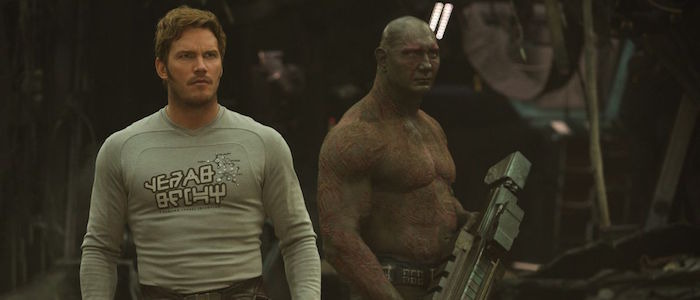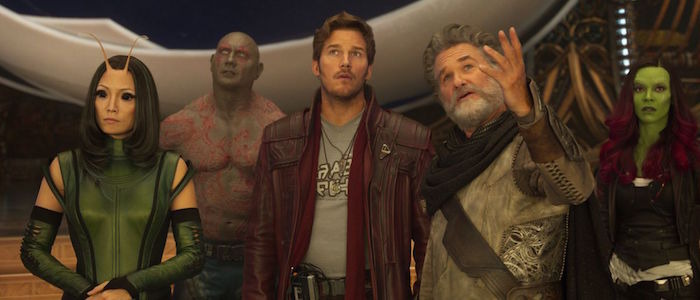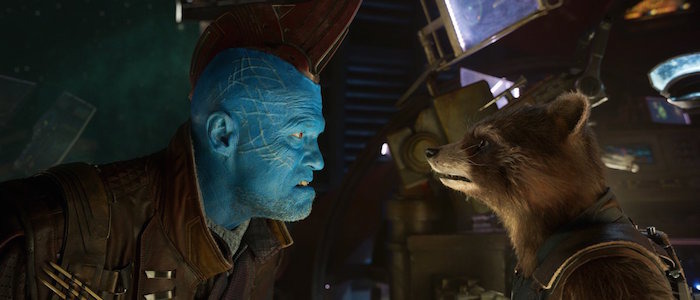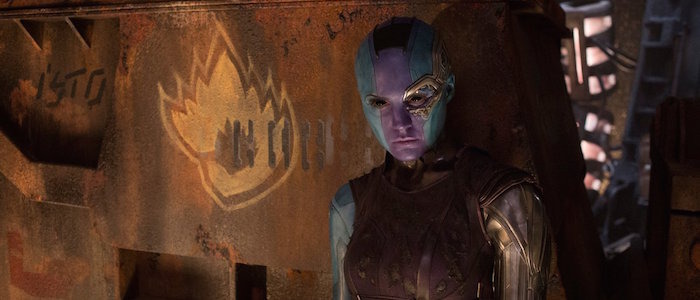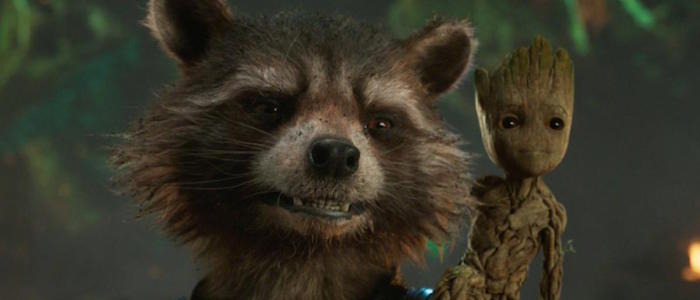Road To Endgame: 'Guardians Of The Galaxy Vol. 2' Is A Soulful Space Opera About Cycles Of Abuse And The Road To Change
(Welcome to Road to Endgame, where we revisit the first 22 movies of the Marvel Cinematic Universe and ask, "How did we get here?" In this edition: Guardians of the Galaxy Vol. 2 deals with cycles of abuse, and becomes unintentional commentary on its director's firing.)Guardians of the Galaxy Vol. 2 occupies a noteworthy place in the Marvel Universe, thanks to both its unique dramatic focus and to the real-world firing of James Gunn. The returning writer-director had, by this point, carved out a unique blockbuster space to discuss thoughtful ideas. The rest of the Marvel series was largely Earth-bound and linear; it focused on men who needed to come to terms with non-specific paternal grief, and whose arcs, more often than not, culminated in punching bad guys. Here, Gunn was given the freedom to tell a story that, while Thanos-adjascent, had little to do with the larger narrative of the Infinity Stones. The only ways it set up future installments were rooted in character.While Gunn was recently re-hired for Guardians of the Galaxy Vol. 3, his haphazard ousting by Disney last year over decade-old shock humour (initially dug up by bad-faith actors upset at his political opinions) was inadvertently reflected in the themes he explored with Guardians of the Galaxy Vol. 2. The film is oodles of fun, but its first three scenes dramatize a complex mission statement.
Opening Arguments
The film's first scene, set 34 years in the past, features a budding romance between Ego (Kurt Russell) and Meredith Quill (Laura Haddock), later revealed to have twisted implications. One extreme of film's thesis is born here, solidified later through revelations about Ego's sinister plan. Though, the twist in the tale is not that this love was a façade, but that it was real, despite existing alongside something aberrant.Following this prologue is the Guardians' raucous reintroduction in the present. The scene is built around a digitally assembled long-take that articulates, through its visual framing, the kinder extreme of the film's thematic spectrum. Now guns for-hire, the Guardians battle a tentacled inter-dimensional beast in a scene bursting with visual splendor; the out-of-this-world action however, is backgrounded and out of focus. The spotlight instead falls on a joyous Baby Groot (Vin Diesel) dancing his way through the mayhem to Electric Light Orchestra's delightful Mr. Blue Sky. The other Guardians — Star Lord (Chris Pratt), Drax (Dave Bautista), Gamora (Zoe Saldana) and Rocket (Bradley Cooper and Sean Gunn) — take turns caring for Goot, as if he were their own child.As the Guardians — a rag-tag group from wildly different origins — collect their reward in the third scene, they stand in sharp contrast to their employers, the gilded, chiseled Sovereign, led by stone-faced high priestess Ayesha (Elizabeth Debicki). The Sovereign are a homogenous people, genetically engineered to be "perfect," but a people whose strive for perfection renders even minor slights and insults against them unforgivable; the presence of foul-mouthed, condescending Rocket, therefore, poses a problem.This backdrop becomes all the more significant through a lens of James Gunn's firing. In July of 2018, Gunn was hastily let go from Guardians of the Galaxy Vol. 3 over decade-old jokes about abuse that he had long since learned from and apologized for — as far back as 2012. The inhumane, robotic Sovereign, whose existence precludes the very possibility of improvement, speaks volumes about the Guardians themselves. They are imperfect, and in many ways vile, yet they're redeemable, a courtesy that was not initially extended to the man Disney had tasked with bringing these characters to the screen.Guardians of the Galaxy Vol. 2 is about the complicated relationships we rarely confront, and how those complications can manifest as aggression and anger — or even "edgy" insult humour, used as emotional defense mechanism. The story is told through action and space-opera, but its focus is on a family of deeply flawed, emotionally injured beings who yearn for catharsis, while also helping each other achieve redemption. It may very well be Marvel's most mature film, zeroing in on the emotional complexities of abuse carried forward into adulthood — the kind of abuse Gunn strongly hinted that he too experienced as a child, an oft-ignored factor in criticisms of his old jokes on the subject.The film also follows Doctor Strange, a story steeped in eastern philosophies, in solidifying the series' new political direction. Rather than paying lip-service to critiques of military power — like Iron Man, Iron Man 2, Captain America: The Winter Soldier and Captain Marvel, which all received U.S. government subsidies — Guardians of the Galaxy Vol. 2 acts as the first in a trilogy of Marvel films, along with Thor: Ragnarok and Black Panther, whose narratives draw from colonial history.
Ego, The Colonizer
Once the Road to Endgame reached Doctor Strange, it seemed the MCU had begun re-orienting its creative perspective. The narrative expectation that Stephen Strange subverted — the western hero self-actualizing through domination — re-appears in Guardians of the Galaxy Vol. 2, but it's now the ethos of the film's antagonist, Ego the Living Planet. Ego's plan, on the surface, is universal destruction, but the specifics of his scheme, and the way he plants literal and metaphorical seeds across the cosmos, bring to mind our colonial past.Ego doesn't just want to destroy our universe. He wants to conquer it by imprinting his identity on all other worlds. He considers his conquest to be a function of his innate superiority, a mission to remake the conquered in his own image and a universally-inspired destiny. These are the very tenets of Manifest Destiny (in the context of Native American genocide), a mission Ego embarks upon in the visage of a white man, with only his genetically superior Celestial progeny deemed worthy of survival. Ego's palace, like Odin's in Thor: Ragnarok, is a museum unto his own history, built on murder. The statues he uses to tell his story are filled with lies.When his mission is threatened by his son Star Lord/Peter Quill, Ego vocalizes his disdainful justification. With their shared, Godlike power under threat, he reminds Quill of the consequences of snuffing it out: "You're a God. If you kill me, you'll be just like everybody else." Ego's contempt for "inferior" beings, his unwillingness to value life, and his inability to recognize the potential for redemption make Ego the perfect villain for this story. His distinctly colonial selfishness is the perfect foil to a film in which characters reach across boundaries to help and forgive each other.The flowers Ego planted across the universe begin to bloom. They consume and terraform a vast array of planets and cultures, externalizing Ego's very drive as a character, as if to homogenize existence itself. Quill however, rejects immortality and Godhood, accepting the flaws and failures of the "everybody else" that Ego would just as soon wipe out. Even the mortals who have hurt Quill are still capable of empathy.Quill taps in to the full potential of his own abilities by recalling what separates him from Ego: love. While functionally inseparable from any other motivation — what connection love has to wielding these powers is unspecific; as is Marvel's M.O., the connection between theme and action is faint at best — Quill's realization brings about an acceptance of the complexity of those in his life. Figures like Yondu (Michael Rooker) and Rocket, for whom showing affection at all is a Herculean task.Quill wields neither unselfish nor unconditional love, but flawed, human love; for Yondu, for Rocket, for Gamora and for all the Guardians. The kind of shared love that has proven to be difficult over the course of the film. And yet, it's the kind of love Ego refuses to understand.Guarding the universe, therefore, hinges on understanding itself. What hangs in the balance isn't just existence, but the opportunity to exist together, and to exist imperfectly.
The Walls of Broken Men
Rocket, the trash-talking, gun-toting Raccoon, rides a fine line between sarcasm and callousness, often crossing over into the latter when addressing Quill. "Orphan boy" is a hard pill to swallow regardless of intent, an insult Quill rightly recognizes as Rocket's attempt to push people away.This Quill is more self-aware than his prior incarnation. Having "reached out" and accepted other people's love, he comes to represent a more mature perspective — perhaps Gunn's own, as he looks back on his own desire to stand out through juvenile jabs and "edgy" insults. The film empathizes with Rocket, and even closes with his own "take my hand" moment (a la Quill's realization in the first Guardians of the Galaxy), thus making Rocket a centerpiece in this tale of wallowing in one's worst impulses. Once the Guardians are separated, Yondu verbalizes Rocket's knee-jerk, self-sabotaging tendencies, because he recognizes himself in the vulgar racoon. Both characters feel used and discarded — Yondu, by parents who sold him into slavery, and Rocket, by scientists who tore him apart — leading to them erecting hyper-masculine emotional walls, nearly impossible to penetrate. Any amount of love or proximity to others leads to emotional outburst; they hurt those closest to them before they can be hurt themselves.However, they eventually come to a common understanding, when Quill is about to sacrifice himself to save the universe. Yondu, having spent decades acting out against Quill — in ways that are arguably emotionally abusive — finally comes to admit that he cares for him like a son. Yondu kidnapped Quill when he was just a boy, but rather than delivering him to the murderous Ego, he kept Quill around to save his life, though he claims it was because he needed a scrawny thief for all those hard-to-reach places.Yondu raised Quill to be a Ravager, teaching him to shoot and offering tender guidance, even amidst threats that his crew would eat him if he failed. That we don't see these tender moments until Quill is forced to tap into them is a fitting choice for the edit; both Quill and Yondu are the type to bury their emotions deep down; they've been conditioned to do so. Yondu's affection is fatherly, but it's marred by his own wounds. The kind of wounds that prevent him from loving fully.This is the kind of complicated love Rocket also harbours for Quill. When Yondu leaves to sacrifice himself for Quill, Rocket believes both men will perish. When Gamora tries to rescue Quill, Rocket stops her for her own safety. As Rocket becomes inadvertent party to Quill's sacrifice, he finally realizes what he's about to lose: a friend.It takes extreme circumstances for Rocket and Yondu to allow themselves to be vulnerable. When Yondu finally does, Quill is able to look up to him as the father figure Yondu always hoped he could be, despite Yondu paying forward the abuse he himself was dealt as a child. As much as Yondu's story seems like one of redemption, it's also a tragedy; not only because he dies, but because it takes being on death's door for him to admit he was wrong. Quill, whether or not he can come to terms with how he was treated as a child, comes to a greater understanding of who Yondu was, and who he wanted to be.After pushing the Ravagers away with his heinous actions (delivering Ego's children before knowing they'd be slaughtered), word of the once-disgraced Yondu travels far. Upon hearing of his noble sacrifice, the Ravagers show up to Yondu's funeral despite the pain he caused them. He redeems himself in death, and proves to Rocket — on whom the film closes — that he's still capable of being loved.
Anger, Paid Forward
Yondu is one of three complicated, abusive fathers in Guardians of the Galaxy Vol. 2, but he's the only one who's redeemed in any narrative sense. The second is Ego, whose genuine love for Quill and his mother is superseded by selfish desire. The third, Thanos, is never seen in this film, though the full scope of his paternal complications in Avengers: Infinity War (in which he kills a daughter he loves for a twisted "greater good") are planted here.Guardians of the Galaxy is a strange franchise compared to its contemporaries. While going from one installment to the next, it turns not one, but two of its villains into empathic heroes. The first, Yondu, is a father who pays forward the same pain he was dealt, but ultimately leans toward love. He finds a shred of redemption through sacrifice, regardless of whether or not his past actions are forgiven — even Quill has a hard time articulating his feelings at Yondu's funeral.The second reformed villain is Nebula (Karen Gillan), whose own story involves an abusive father (Thanos, who pays his own pain forward as well). Despite Thanos' one prior on-screen appearance — three, if you count post-credits scenes — nothing about the Mad Titan was particularly fleshed out. That is, until Nebula first speaks of why she resents him.Like, Ego, Thanos is a father for whom redemption seems out of the question. As children, Nebula and her sister Gamora were repeatedly set against one another in battle. The winner was hardened through survival. The loser had a body part replaced by machine. Gamora was usually the victor, but both sisters were molded into warriors regardless.They were both also loyal to their father well into adulthood. Instead of rebelling against Thanos, one of the most powerful beings in the universe, Nebula and Gamora turned their resentment on one another, as abused siblings are sometimes wont to do. They see each other as the cause of their pain, and while they reconcile by the end of the film, both sisters (Nebula especially) still hold on to their anger. Though now, as they part ways after reconciling, they have a more useful place to direct their rage, given their oncoming fight with Thanos.
The Long Road to Change
The film never endorses the angry, occasionally violent manners in which its characters lash out — Yondu's threats to a vulnerable child, Nebula trying to kill Gamora, Rocket's hurtful jabs — but it most certainly empathizes with them. Gunn's superhero family saga understands the real-world complexities of parental love and abuse, things that, while far from ideal, often go hand in hand. They leave long-lasting emotional scars which can be difficult to process, often resulting in anger directed elsewhere.Sometimes these abusive elements are hard to recognize, especially when they're masked by love — like Ego's manipulation of Quill as they play catch for the first time, filling a hole in Quill's heart. Sometimes the opposite is true, with genuine love being buried deep down beneath hardened masculine exteriors, like Yondu's refusal to open up to a boy he so clearly loved as a son. Regardless of whether it should be, love is often difficult when the ways in which you have loved, or have been loved, have caused you pain.Cycles of violence and abuse can hurt us in ways that make us, in turn, hurt those we care about. Though it doesn't have to stay that way. By the end of the film, the Guardians begin to recognize how they can be better; Drax learns to be kinder to Mantis, in his own way (the Guardians films leave much to be desired when it comes to the insults hurled at women); Gamora learns to accept Nebula as her sister, despite a violent past that neither one can fix; Rocket learns that he's still worthy of being loved, despite his actions; Quill even embraces baby Groot to Cat Stevens' Father and Son, having learned first-hand the complicated nature of building and caring for a family, when the love in one's past is so intrinsically tied to one's pain.Guardians of the Galaxy Vol. 2 is a weird, hilarious action movie filled to the brim with Marvel Easter Eggs — from Stan Lee and The Watchers, to the "original" Guardians from the year 3000 — but it's grounded in the kind of human drama we rarely see in movies of this scale. Rather than disguising its themes under layers of alien metaphor, the film tells direct stories of broken characters trying to be better together.For Yondu, Nebula and Rocket, their abuse manifest as hardened mechanical parts, threatening to make them more Sovereign-like and less human. But the Guardians decide not to stay broken, even if their emotional scars aren't fully healed by the end of the film. The road to fixing themselves is a long one, a journey they've only just begun to take, but it's a journey they're taking together.The film, a mash-up of space opera and intimate drama, is best summed up by its final shot: a close up on a trash-talking, gun-toting cybernetic Racoon, shedding a tear because he realizes that no matter how broken he thinks he is, and no matter how much he pushes people away in anger, he'll still be loved at his funeral.
***
Expanded from an article published April 20, 2018.

